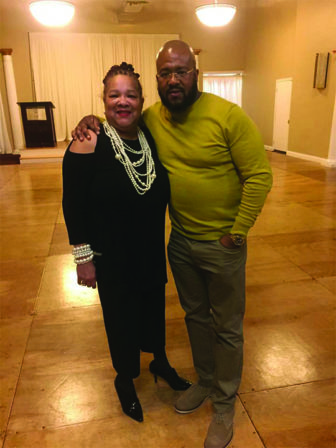
Bettye L. Blaize and her son and co-author Terrence White
As a mother of a formerly incarcerated son, I know all too well the struggle that comes with having to ask for help from service providers and others engaged in the system. Even though these relationships were not easy to form, developing strong relationships with service providers was such an important step in my son’s success both during and post-incarceration.
The following tips for service providers, which all come from my newly released book “Doing Time with my Son: A Mother and Son’s Enduring Love through Incarceration” (co-authored with my son Terrence G. White and published by Full Circle Press, 2017), provide concrete suggestions for how you, as service providers, can work together to build relationships with mothers.
- Don’t look at the mother of an incarcerated young man as if she’s failed. Instead, look for areas in which she may not be strong and then help her to address those areas.
- Be able to provide mothers with resources that have proven track records of helping families heal and incarcerated young people become successful. For parents, one of the worst things that happens is when they reach out for help and they don’t get it. Have a list of resources ready to provide the mothers with upon request.
- If you don’t know the answer to something an inmate’s family member asks you, find it. Please never tell a parent that there’s nothing you can do. I reached out for preventive stuff and was told time and again that there’s “nothing we can do until he actually does something,” which in a way actually gave him a license to do whatever he was going to do.
- With a listening ear, listen to every word a mother says — whether a young person is stealing, coming in late, or sleeping all day. Take in as much information as you possibly can to make sure that you can best service the young man and his mother.
- After listening, size up the type of treatment the young person may need, whether a 30-, 60- or 90-day inpatient or outpatient program. Create a roadmap for the mother so she has some idea of what she can expect.
- Let the mothers know about the support that’s out there for them. Let them know that they need to be more educated themselves about the depths of the addiction so that they can better service their child. Help parents understand that addiction is a family disease — know that this might be a paradigm shift for the family, so help guide them through it.
- Learn to listen to mothers without judgment. Some of the mothers you come into contact with might not look like what you think mothers should look like, but the most important thing you can do is listen without condemnation and seek first to understand where they’re coming from, what their pain points are and how and why they might be reaching out for help.
- Once you do open up a good dialogue with mothers, reassure them that they’re not alone in what they are going through with their sons. Let them know that coming for help was the best thing they could have done for both themselves and their sons. Make sure they know that you appreciate all they have done to love and guide their sons and that the resources you’re recommending are additional supports, not replacements or punishments. They don’t come to you to get beat up; they come to you because they want and need help.
- When you suggest resources, make sure that you’ve checked on them and that the services you’re recommending are still available and accessible. It’s very frustrating to go home excited to make that phone call only to find out that the service is either no longer available or that your son doesn’t qualify. Make sure that resources are current and applicable to the needs of the family you’re working with. The resources need to be tailored to whatever the situation is — the last thing a mother needs is a run-around when she’s already running in circles. She doesn’t need the people who she’s relying on to provide her with information to send her on another wild goose chase.
- If possible, help the family find any resources necessary to facilitate visitation. If a mother is not showing up, try to find out what barriers exist. Maybe it’s transportation or child care or finances or work schedules, but if a family isn’t visiting, try to find out why so that you can help to provide the necessary resources.
Bettye L. Blaize is the co-author of “Doing Time With My Son,” written with her son Terrence White. After retiring from Holiday Inn after 29 years, she worked for the Urban Leadership Institute in Baltimore and now the Cambio Group.